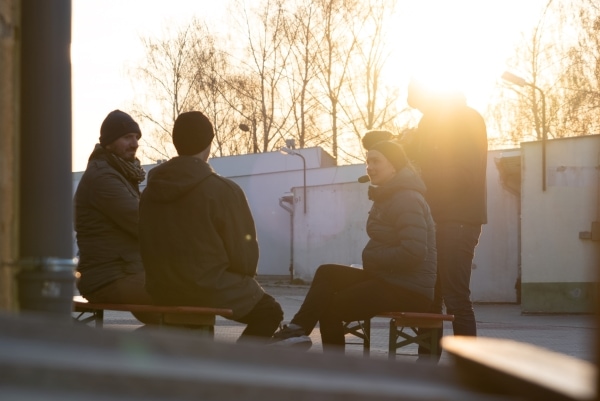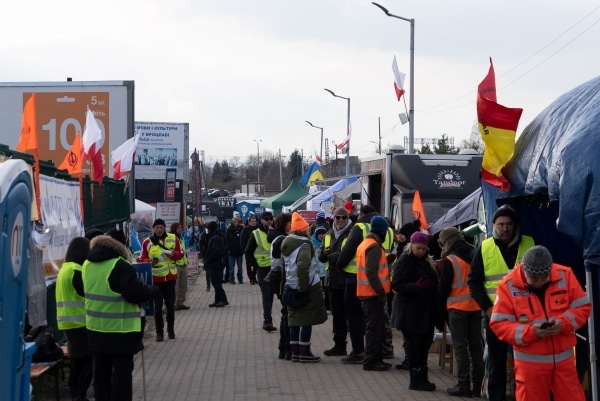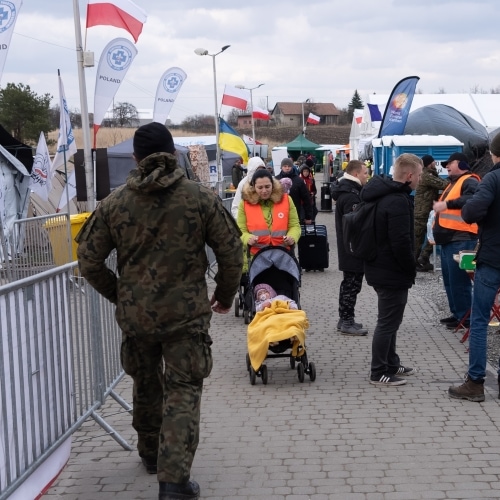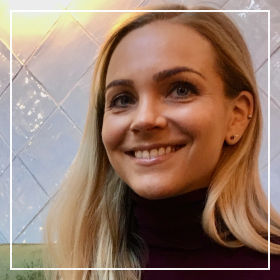Research takes you to unexpected places. After finishing my PhD, I got a postdoc position at the ERC-funded project WARFUN led by Antonio De Lauri at the Christian Michelsen Institute in Norway. Despite the project’s playful and provocative title, it is driven by a serious and anti-war agenda: In order to better understand and possibly even mitigate the human costs of war, we need a richer and more nuanced understanding of what draws people to participate in war and how it might be experienced as pleasurable, normalised or addictive. The project thus investigates the plurality of experiences and affective grammars that are generally neglected by normative approaches to war and soldering, including joy, happiness, mastery and self-realisation.
In April 2022, Antonio and I travelled with a small film crew to the Polish-Ukrainian border. Our purpose was to talk with some of the many “ordinary” citizens we had learned were travelling to the new war theatre in Europe to join the Ukrainian Foreign Legion. This was not a part of our personal research projects, but one of several trips we were doing together with two documentary makers attached to the project, exploring the attraction and experience of war across different societies.
Fieldwork had made me increasingly suspicious of scholarly “crisis-chasing”.
I had ambivalent feelings about the trip. On the one hand, I experienced similar desires as some volunteers I had interviewed for my doctoral research: people who had travelled to Lesvos during the height of the “refugee crisis” in 2015. Like them, as indeed many other humanitarians, journalists and scholars, I felt an urge to “be there” and witness history unfolding with my own eyes (Mogstad 2021; Papataxiarchis 2016). More significantly, I also supported the documentary’s vision and believed it could reach a wider audience than academic research and spark new conversations. On the other hand, my doctoral fieldwork had made me increasingly suspicious of scholarly “crisis-chasing” (Cabot 2019; Rozakou 2019), which I now felt complicit in.
However, our first meeting in Poland reinvigorated my belief in the project. We had stopped at a restaurant in the town Rzeszow, about an hour’s drive from the border. A week earlier, Joe Biden had travelled there to signal Washington’s intention to defend their NATO allies if the war spilt westwards. After sharing pizzas with US soldiers stationed in the area, Biden had told them they were “in the midst of a fight between democracy and an oligarch.” Certainly, this ideologization of the war was not new. Since the onset of Russia’s large-scale invasion of Ukraine on 24 February, western public discourse has continuously framed the Russo-Ukrainian war as a battle between democracy and dictatorship, civilisation and barbarism, good and evil. There are several problems with this framing. First, it simplistically and inaccurately portrays NATO as a community of democratic values rather than a pragmatic security arrangement. Second, this way of thinking nourishes the idea of a radical division between Russia and “the West”, thus reinforcing the mantra that war is inevitable (and diplomacy impossible) or even noble and desirable.
But ideology was far from the only motivation that pulled people to the warzone. While waiting at the counter to pay for our lunch, a white, middle-aged man with short hair and tattooed muscular arms turned towards us with a beer in his hand. “Are you guys heading to the fun zone?”, he asked with a cheeky smile and nodded to the camera my colleague was carrying. I had to struggle to contain my mixed feelings of excitement, revulsion and curiosity. Why did he describe the war in Ukraine –with its horrendous damage to human lives and infrastructure– as a place of fun? Was it just an expression of irony or gallows humour or did he really mean it? Moreover, what did my strong emotional reactions say about my personal distance and relationship to the topic of the WARFUN project?
War can be imagined and experienced as entertaining, pleasurable and even personally regenerating.
Both contemporary western discourse and scholarly literature tend to frame war as destructive and undesirable. Moreover, participating in war is typically portrayed as a brutal and painful experience, demanding enormous sacrifice and causing suffering or alienation (MacLeish 2019; Welland 2018). However, in recent years, some scholars have challenged this view. Exploring war from the vantage point of soldiers’ narratives and anticipations, they have shown that war can be imagined and experienced as entertaining, pleasurable and even personally regenerating (Dyvik 2016; Pedersen 2019). Our encounter at the restaurant in Rzeszow affirmed these observations, yet also added nuance. The man who approached us, “Peter”, turned out to be a US army veteran who had served several tours in Afghanistan, Iraq and Central America. When Peter’s mother first saw her son in his military uniform, she had cried with pride, and Peter had felt honoured and accomplished. However, his many years of military service had not come without costs. About six months ago, Peter was involuntarily discharged from the army after being diagnosed with post-traumatic stress disorder (PTSD). He took it hard: soldiering had become part of his identity and lifestyle, and he did not know what else to do. Hence, after watching the news about the Russian escalation of the war in February 2022, Peter bought a plane ticket to Poland. “I’m here to help, not to fight,” he underscored during our short conversation at the restaurant. However, when we invited him for dinner the following day, Peter offered a more complex set of reasons. “I am an adrenalin junkie,” he said plainly when we asked him why he had referred to Ukraine as a fun zone. Additionally, Peter admitted that he was not only a humanitarian, but also an entrepreneur: His short-term plan was to help people, but his long-term goal was to learn enough about the situation on the ground to get a contract with the US Army (see De Lauri 2022).

Other conversations also complicated the image of the war as a clear-cut ideological battle. Some of the people we spoke to were planning to volunteer for the Ukrainian Foreign Legion. For instance, in the village of Medyka, on the busiest border crossing between Poland and Ukraine, we met “Mathias”, a 25-year-old man from Finland. While growing up, Mathias had been “taught by [his] uncle to hate the Russians.” However, his personal motivations for going to Ukraine were not primarily ideological. As he explained to us over a pint of beer, Mathias considered volunteering for the Foreign Legion a chance to participate in a “a real big war”: the first such opportunity since World War II and, in Mathias’s opinion, far more interesting than what the Finnish peacekeeping forces were currently experiencing in countries like Lebanon and Mali. Like most of the Norwegian soldiers I have interviewed in my ongoing research project, Mathias also wanted to “test himself” and the skills he had gained when serving in the Finish army as a conscript. Moreover, Mathias had run into economic problems at home and wanted a new start, in a new country. He was willing to take big risks for a chance to experience “real war” and restart his life. In two days, Mathias had agreed to drive a van to Mariupol to deliver medical supplies. He hoped his bravery would become noticed and that the Foreign Legion or Ukrainian army would invite him to join them.
He was willing to take big risks for a chance to experience “real war” and restart his life.
Similar to Lesvos during the “refugee crisis” (Franck 2018; Papataxiarchis 2016), the Ukrainian-Polish border attracted all kinds of people with different motivations and agendas: We saw journalists, celebrities, religious organisations, and a wide range of humanitarian volunteers, including a group of Chinese dissidents and a young woman giving out “free hugs” and kinder-eggs. However, it was striking how many war veterans we met who told us they were going to Ukraine to do humanitarian work. Like the foreign fighters, these soldiers–turned–humanitarians told stories that fitted uneasily with the ideologization of the war that has characterised western public discourse. For instance, at the so-called Chinese tent by the border, we met a Dutch veteran named “Dirk”. Dirk had served several tours in Afghanistan and Iraq, but emphasised that he was now here to do humanitarian work. Before leaving for Poland, Dirk had bought a big old bus, refurbished it, and painted it white. The next day, he and another veteran were driving to Kiev to deliver medicine and food, and bring back as many elderly people, women and children as they could fit on the bus. When we asked Dirk why he was doing this, he said he had the necessary skills and experience to navigate a war zone. However, reflecting on his transition from soldiering to humanitarian work, he also said that he “wanted to share love rather than aggression.” Dirk further emphasised that he did not want to join the Ukrainian army or the Legion because that meant he would have to pick a side. “There are victims on both sides of the war and I don’t want to shoot Russian kids,” he elaborated, referring to the many young Russian soldiers who reportedly were told they were heading for military exercises.
It is questionable whether all the people we spoke to told us the truth about why they were going to Ukraine.
Notably, all of the veterans we spoke to decried politics (democratic or otherwise), describing it as inherently self-interested and “dirty”. However, in contrast to many European politicians, their personal experiences of participating in wars and military operations had also made them sceptical of military power as a means to bring peace and security. For instance, while crossing the border into Ukraine, we met “Michael”, an American veteran who was currently working on a humanitarian project to rebuild damaged infrastructure in Ukraine. After his second tour in Iraq, Michael had grown increasingly disillusioned with the war and described the US missions in the Middle East as utterly stupid and meaningless. Similarly, “Jonas”, a Norwegian veteran who had started a humanitarian organisation providing aid to Ukraine, said the post-intervention developments in countries like Kosovo and Afghanistan had made him and many of his former colleagues question the purpose of Norway’s military efforts. “Like many others, I was seeking adventure and I truly enjoyed the experience of serving abroad and mastering soldiering. However, in retrospect, it feels bittersweet. Did we really risk our lives for nothing?”, he pondered when we met again at a café in Norway a few months later.
At this point, two disclaimers should be made. First, as pointed out by a reviewer of this piece, it is questionable whether all the people we spoke to told us the truth about why they were going to Ukraine. Many people at the border might have reasons to conceal their purpose and identity, including foreign soldiers, spies, and traffickers. Second, as mentioned, this was not a research trip but a documentary mission, and we only spent a few days at the border. Apart from Jonas, whom I recruited for my research project on Norwegian soldiers, the meetings we had were too transient to develop trust and produce insightful ethnographic descriptions and analyses.

Nevertheless, as a junior scholar new to the field of war and soldiering, I found our encounters at the border to be thought-provoking. It struck me that the war veterans we spoke to provided first-hand and cogent critiques of war, enemy constructions, and military power at a time when even former pacifists call for weapon assistance to Ukraine and societies across the continent prepare themselves for war. Their personal stories and statements challenged reductive and binary representations of war as either destructive or generative, meaningful or meaningless, pleasurable or alienating.
The point I want to make is more basic and perhaps also less edifying.
For instance, even while describing themselves as adrenaline junkies or adventure-seekers, several war veterans pointed to the more sinister aspects of soldiering. As Peter told us soberly, “war corrupts people. It makes you do things that feel natural and justified then, but later comes back to haunt you.” Besides his quest for adrenalin and money, Peter thus described his humanitarian work in Ukraine as a means to heal, even atone for the wounds he had inflicted on himself and others. Similarly, Michael framed his transition from soldiering to humanitarianism as a means to “make amends” and “regain agency and control of his actions.”
As a reviewer pointed out, these statements can be read via Michael Jackson’s notion of the “logic of reversal”, that is, as attempts to repair what is broken or make the world right. However, the point I want to make is more basic and perhaps also less edifying: Regardless of how the war veterans felt about the current war in Ukraine, and whether or not they carried any guilt or misgivings about their soldiering past, they all appeared attracted by war. What is more, the pull of war seemed to have just as much (or more) to do with what the war could offer them as with what they could do for the Ukrainians. As Jonas explained when I interviewed him in Norway: “The war does not leave our bodies when we return home from the battlefield. We veterans, we are like spente buer [tight arrows]. We need to go somewhere to release our tensions.” For him, as for many of the other people we spoke to during our short trip, the war in Ukraine was a good option as it promised both thrill and purpose. It also offered them an opportunity to remake themselves as warriors, entrepreneurs or humanitarians.
References
Cabot, H. 2019. The business of anthropology and the European refugee machine. American Ethnologist 46(3): 261–275.
De Lauri, A. 2022. The idea of clean and efficient war is a dangerous lie. FocaalBlog, 18 April.
Dyvik, S. L. 2016. “Valhalla rising”: Gender, embodiment and experience in military memoirs. Security Dialogue 47(2): 133-150.
Franck, A.K. 2018. The Lesvos refugee crisis as disaster capitalism. Peace Review 30(2): 199–205.
MacLeish. T. 2019. How to Feel about War: On Soldier Psyches, Military Biopolitics, and American Empire. BioSocieties 14(2): 274–299.
Mogstad, H. 2021. Humanitarian shame and cosmopolitan nationalism: Norwegian volunteers at home and abroad (Doctoral thesis, University of Cambridge).
Papataxiarchis, E. 2016. Being ‘there’: at the front line of the ‘European refugee crisis’ part 1 and 2. Anthropology Today 32(2-3).
Pedersen, T.R. 2019. Ambivalent anticipations: On soldierly becomings in the desert of the real. Cambridge Journal of Anthropology 37 (1): 77–92.
Rozakou, K. 2019. “How did you get in?” Research access and sovereign power during the “migration crisis” in Greece. Social Anthropology 27(1): 68–83.
Welland, J. 2018. Joy and war: reading pleasure in wartime experiences. Review of International Studies 44(3): 438-455.
Featured image by Anders Hereid & Vegard Lund Bergheim.





